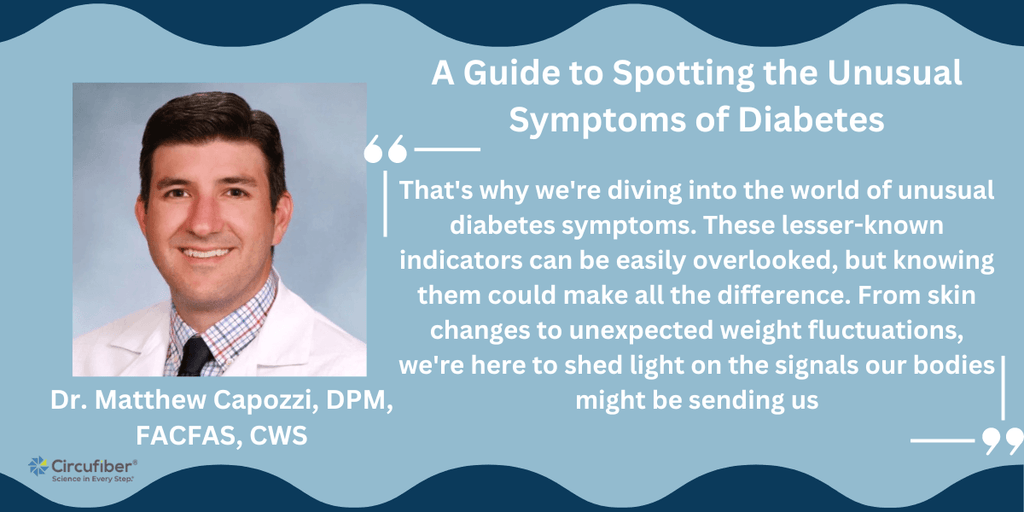Medically Reviewed by:Scientific Advisory Board
When we think of diabetes, the usual suspects like frequent urination and excessive thirst come to mind. But what about the signs that fly under the radar? Yes, diabetes can be a bit of a sneak thief, presenting symptoms that many of us wouldn't immediately link to blood sugar issues.

That's why we're diving into the world of unusual diabetes symptoms. These lesser-known indicators can be easily overlooked, but knowing them could make all the difference. From skin changes to unexpected weight fluctuations, we're here to shed light on the signals our bodies might be sending us.
Unusual Symptoms of Diabetes
When we think about diabetes, the first things that often come to mind are high blood sugar levels, excessive thirst, and frequent urination. But, diabetes can manifest through a variety of lesser-known symptoms that might escape our notice until we know what to look for. Understanding these signs can be crucial in recognizing diabetes early and managing it effectively.
Darkening of Skin Areas: One of the more unexpected symptoms is the darkening of skin, particularly around the neck and armpits. Medically known as acanthosis nigricans, this condition is often a warning bell for insulin resistance, a hallmark of type 2 diabetes.
Sudden Changes in Vision: Fluctuating blood sugar levels can also lead to sudden vision changes. High blood sugar can swell the lenses in the eyes, causing blurry vision. Though this symptom can be temporary, it’s essential not to dismiss it, as consistent high blood sugar levels can lead to more severe eye problems over time.
Unexplained Weight Loss: While losing weight without trying might seem like a welcome surprise, it can be a concern for those with undiagnosed diabetes. When the body can’t use glucose effectively, it starts burning fat and muscle for energy, leading to unexpected weight loss.
Feeling Unusually Fatigued: Diabetes can significantly impact energy levels. Even after a good night’s sleep, one might still feel exhausted. This fatigue arises because the body struggles to convert glucose into energy efficiently.
Slow-Healing Sores and Frequent Infections: High levels of sugar in the blood can impair the body’s healing process and its ability to fight off infections. If cuts take longer to heal than usual or you're experiencing more infections than normal, it could be a subtle sign of diabetes.
Recognizing these unusual symptoms can guide us to seek medical advice and get tested for diabetes. Early diagnosis means we can start managing the condition immediately, reducing the risk of complications. By being aware of these hidden signs, we're better equipped to protect our health and well-being.
Symptoms that Fly Under the Radar
Diabetes cloaks itself with a range of symptoms that might not immediately scream "blood sugar issues." We're delving into those lesser-observed indicators that might be easily missed or misconstrued for other health concerns.
Subtle Changes That Signal Warning
First, it's vital to recognize unexpected manifestations, such as darkened areas of the skin, especially around the neck and armpits. Known medically as acanthosis nigricans, this condition may hint at insulin resistance, a precursor to diabetes.
Vision fluctuations also join the list of covert symptoms. If your glasses suddenly don't seem to work as they used to, it might not just be a prescription issue. Diabetes can affect the fluid levels in your eyes, leading to these sudden changes.
Unexplained weight loss, even though a consistent or increased appetite, could be another red flag. When your body can't effectively use glucose for energy due to insulin issues, it starts burning fat and muscle instead, leading to weight loss.
Feeling exhausted without a clear reason? High blood sugar levels can lead to fatigue as glucose remains in your bloodstream instead of energizing your cells. This symptom is tricky because it's common to a host of other conditions as well.
Finally, pay close attention to how quickly your sores heal and whether you're getting infections more frequently. Impaired blood flow and high glucose levels create a less-than-ideal environment for healing, making you more prone to infections.
Understanding the Unseen
Recognizing these subtle signs is crucial for early detection and management of diabetes. Each of these symptoms, while possibly indicative of other health issues, warrants attention and a conversation with a healthcare provider if you suspect something's amiss. Remember, early intervention can significantly alter the course of diabetes and potentially prevent the onset of more severe complications.
Unusual Symptoms of Diabetes
Conclusion
Recognizing these unusual signs is our first step toward taking control of our health and preventing the progression of diabetes.
It's crucial we listen to our bodies and not dismiss these subtle cues. Whether it's the unexpected darkening of the skin, vision changes, or unexplained weight loss, each symptom is a piece of the puzzle in our overall health picture. Let's use this knowledge to our advantage, stay vigilant, and seek medical advice when these uncommon symptoms arise.
References, Studies and Sources:
https://www.cdc.gov/diabetes/basics/diabetes.html
More About Circufiber.com and Healthcare disclaimer:
Always consult your physician before beginning any program. This general information is not intended to diagnose any medical condition or to replace your healthcare professional. If you experience any pain or difficulty, stop and consult your healthcare provider. Circufiber.com socks are clinically proven to improve micro-circulation in feet and lower extremities in people with Diabetes.
More Author Information:
Dr. Capozzi is a board-certified foot surgeon through the American Board of Foot and Ankle Surgery. He is a Diplomate of the American Academy of Wound Management and Fellow of the American College of Foot and Ankle Surgeons. He completed a three-year residency program in Foot and Ankle Reconstructive Surgery at St. Francis Hospital & Medical Center in Hartford, CT in 2010. Dr. Capozzi is a board-certified Wound Specialist® granted by the American Academy of Wound Management. He is also board-certified in Foot Surgery through the American Board of Foot and Ankle Surgery.




